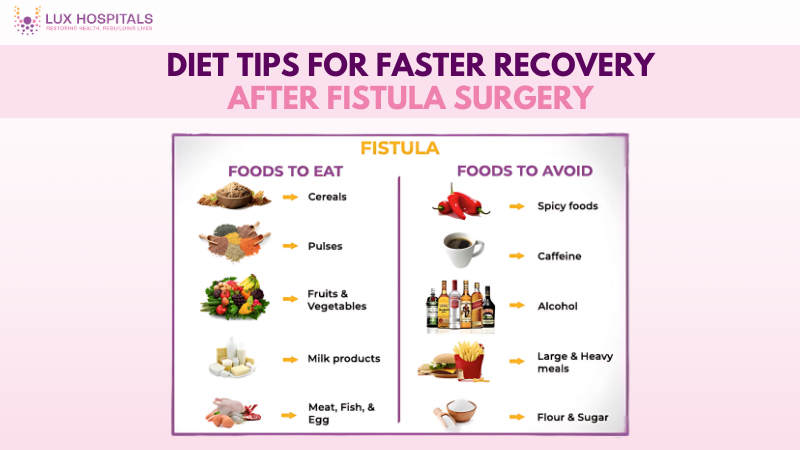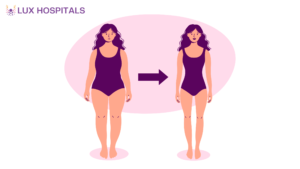Diet Tips for Faster Recovery After Fistula Surgery

Healing after fistula surgery takes patience, rest, and the right food. What you eat directly affects how easily you pass stools, how quickly your wound heals, and how comfortable you feel during recovery. Following a smart Diet for faster recovery after a fistula can reduce pain, prevent complications, and support steady healing. Eating the right foods gives your body the building blocks it needs to repair tissue and fight infection. Good meals reduce swelling, keep your energy up, and make moving and everyday tasks easier while you heal. Small changes—like adding soft proteins, sipping more water, and choosing gentle fibers—add up quickly to real comfort.
Why food matters?
After surgery, your digestive system is more sensitive than usual. Hard stools or constipation can cause pain and put pressure on the surgical site, slowing down recovery. Eating the right foods helps soften stools, minimize straining, and provide nutrients like protein, vitamins, and minerals that aid in tissue healing. A tailored diet for rapid recovery after a fistula can make the difference between a speedy recovery and ongoing discomfort.
Simple rules to follow
These small but powerful rules are easy to stick with:
- Eat small meals often – Large meals are harder to digest; smaller ones are gentler on your stomach.
- Sip water regularly – Hydration keeps stools soft and prevents constipation.
- Increase fibre slowly – Too much fiber suddenly can cause gas and bloating; take it step by step.
- Add protein to each meal – Proteins rebuild tissues and speed healing.
- Cook foods gently – Boiling, steaming, or stewing makes food easier to digest.
These rules form the base of a Diet for faster recovery after a fistula that feels practical and healing-friendly.
Fibre: the stool softener
Fiber is your best ally for smooth bowel movements. Soluble fiber (like oats, dal, and fruits) absorbs water and makes stools softer. In contrast, insoluble fiber (like whole grains and vegetables) adds bulk for easier passage. Begin with soluble fiber, then gradually add insoluble sources as your system adjusts. Without fiber, stools become stiff and painful to pass, which can irritate the wound.
Good fibre choices
- Oatmeal porridge in the morning
- Moong dal or masoor dal for lunch or dinner
- Soft sabzi like lauki, spinach, or carrots
- Fruits with pulp, such as banana, apple, papaya
- Brown rice, whole-wheat roti, or dalia
Fiber, combined with enough fluids, is a key part of any Diet for faster recovery after a fistula.
Hydration: fibre’s best friend
Fiber only works well when paired with enough water. Without water, fiber can make stools harder. Aim for 8–10 glasses spread through the day, not gulped at once. Hydration also prevents dehydration caused by medicines or mild blood loss from surgery.
Hydration ideas
- Warm water in the morning to stimulate the bowels
- Coconut water for natural electrolytes
- Clear soups for hydration and nutrients
- Thin buttermilk or lassi for gut comfort
Keeping your body hydrated is a simple, reliable way to support a Diet for faster recovery after.
Protein: building blocks for healing
Surgery means your tissues are healing from cuts and stitches. The amino acids your body needs to repair itself are found in protein. Cells repair wounds faster. Without protein, healing slows and energy levels drop. Include a small protein source in every meal to help your body recover steadily.
Gentle protein options
- Lentils/dals (cooked until soft)
- Paneer or tofu for vegetarians
- Curd and yoghurt, which also aid digestion
- Eggs (soft-boiled or scrambled)
- Fish and chicken (steamed, poached, or lightly cooked)
Proteins are essential in your Diet for faster recovery after a fistula because they directly support tissue repair and immune strength.
Healthy fats: comfort without heaviness
Many people cut out fats after surgery, but the body needs a small amount of healthy fats for energy, nutrient absorption, and comfort. The trick is choosing the right fats and using them in moderation. Avoid fried and greasy options, and instead choose natural, heart-healthy fats.
Easy ways to include them
- A teaspoon of ghee in khichdi for flavour and digestion
- Olive oil or groundnut oil for light cooking
- Nut butters in porridge or smoothies for extra calories
Healthy fats make food tastier, filling, and balanced—an essential part of a Diet for faster recovery after a fistula.
Probiotics: calm, balanced gut
Painkillers and antibiotics after surgery can upset your gut and sometimes cause constipation or diarrhea. Probiotics restore healthy bacteria in your intestines, keeping digestion smooth and comfortable. Curd and probiotic drinks are natural and effective choices that support gut balance.
Adding probiotics daily ensures your diet supports faster recovery after a fistula by working with your gut rather than against it.
Foods and habits to limit
Not all foods are your friends during recovery. Some irritate the gut, others harden stools, and a few can trigger bloating and pain. Limiting these foods is just as important as adding the right ones.
Avoid or reduce
- Very spicy curries and chilli-heavy meals (they irritate the wound)
- Fried and greasy snacks (they slow digestion)
- Processed foods and packaged snacks (low fibre, low nutrients)
- Excess coffee or tea (can dehydrate and harden stools)
- Alcohol and fizzy drinks (irritating and dehydrating)
Cutting down on these foods makes your Diet for faster recovery after a fistula much more effective.
Gentle cooking methods
The way you cook food affects how your body handles it. Heavy frying or spicy seasoning can upset digestion, while gentle cooking methods make foods soft, light, and easy to pass.
Best methods for recovery
- Steaming vegetables and fish
- Stewing dals or lentils until very soft
- Pressure cooking khichdi or rice
- Baking or poaching proteins like chicken or eggs
These cooking methods support a safe and soothing Diet for faster recovery after a fistula.
Bathroom and daily routine tips
Food is only half the story—your bathroom habits and routine matter just as much. Straining can harm the healing area, so prevention is key.
Helpful tips
- Go at the same time daily to train your bowels
- Never push or strain; let stools pass naturally
- Take short walks to stimulate digestion
- If constipated for 2–3 days, call your doctor for advice
These routines, paired with a thoughtful Diet for faster recovery after a fistula, keep your healing smooth.
Conclusion
Your body heals best when supported with soft, nourishing foods, steady hydration, and calm digestion. Focus on fiber, fluids, proteins, and probiotics while avoiding overly spicy or greasy meals. Stick to small, frequent portions, cook foods gently, and maintain consistent daily habits. A patient’s steady Diet for faster recovery after a fistula reduces pain, avoids constipation, and speeds wound healing. Over time, these food habits won’t just help you recover—they’ll also support long-term digestive comfort and overall health.
Frequently Asked Questions
Begin with soft, mild foods such as oatmeal, khichdi, soups, yogurt, and gently cooked vegetables. Add a small portion of protein, such as dal, eggs, fish, or tofu, to each meal. Eat small meals often and sip water throughout the day.
Increase fiber slowly and drink plenty of water so stools stay soft. Keep meals small and regular, and add gentle movement like short walks. If you still strain, talk to your doctor about a fiber supplement or stool softener.
A small cup may be fine for many people, but too much caffeine can dehydrate you. If you notice harder stools or irritation, switch to herbal tea or decaf for a while. Always listen to your body’s signals.
Khichdi, dal, curd, soft-cooked sabzi, oats porridge, and brown rice are all helpful. Go easy on spices and oil to keep digestion calm. These choices fit nicely into a gentle meal plan.
A small daily serving of curd/yogurt or probiotic yogurt can support gut balance. Start with a few spoonfuls and increase as you feel comfortable. If dairy bothers you, consider non-dairy probiotic options after asking your doctor.





















